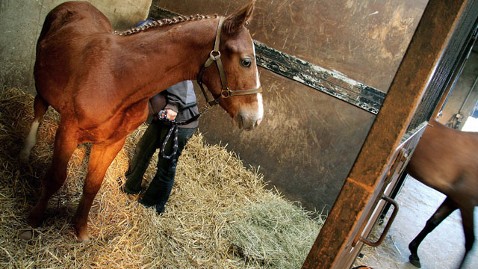Cloned Horses Allowed in Olympics

Laurent Cipriani/AFP/Getty Images
ABC News' Maria Fleet reports:
The group that governs international equestrian events, including the Olympics, has lifted its ban on cloned horses participating in competitions. The Fédération Equestre Internationale in Lausanne, Switzerland, announced the change in June after discussions at an international forum of its members and experts.
Dr. Graeme Cooke, the federation's veterinary director, says little was known of the science or the outcome of cloning at the time of the ban. "We now know that the clone is only a 98 percent copy of the original," Cooke said.
The maternal environment, training, the skill of the rider and the rider's relationship to the horse have an impact on a competitive horse, he said. "Therefore, we came to the conclusion that there were so many variables there were no unfair advantages that were contrary to the spirit of sport," he added.
That doesn't mean a clone will be participating in this year's Olympic equestrian events of dressage, jumping and eventing (a combination competition). Any potential champion clone horses are still too young. Cooke estimates that there are hundreds of cloned competitive horses spread from the United States to Europe, but the practice of cloning is so new that none is old enough to compete yet.
Cloned horses so far have been used mainly for breeding. Mary Chapot, an Olympic equestrian who now breeds and trains horses at her farm in New Jersey, said she has paid to clone the Gran Prix champion show-jumping horse Gem Twist, producing a near-copy, Gemini.
Gem Twist was a gelding, meaning he couldn't procreate. Although he came from a long line of winning show-jumpers, his premiere bloodline would have died out without the cloning procedure that produced the new stallion, Gemini, who has so far fathered six foals. The federation ruling, which covers both clones and their progeny, is good for Chapot's breeding business. If any of the foals Gemini has fathered turn out to be champions, they'll be eligible to reach for Olympic gold.
It's too soon to know if they'll be winners, though. "They're not even weaned from their mothers yet," Chapot said.
Show-jumpers don't start competing until they're 4 or 5, and must be 9 to qualify for the Olympics.
So it's still a mystery whether the young horses will be gold medalists or just ordinary dappled grays with world-class genes. "If you simplify it, it's like an identical twin," Chapot said. "And as anyone who has twins knows, they don't have the same personalities."